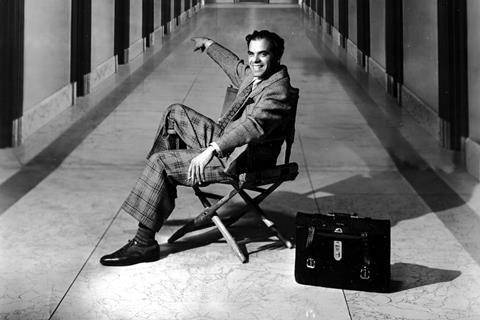Pacy exploration of the life and legacy of celebrated ’It’s A Wonderful Life’ filmmaker Frank Capra

Dir. Matthew Wells. US/UK. 2023. 92 mins.
Matthew Wells glides through the life of Frank Capra with the ease of a practiced Hollywood documentarian – although Mr America is his first feature-length film after a series of shorts on Stanley Kubrick, and it marks the first picture from Park Circus founder Nick Varley’s production company Ten Thousand 86. Screening at Venice Classics, this blithe run-through the life of a renowned yet personally elusive figure in cinema may inform as opposed to enlighten, but it will suit any high-end streamer or terrestrial service showing a season of Capra’s work. Sony, mother of Columbia Pictures where Capra made his name, holds worldwide rights.
A pacy primer for audiences who are new to the director’s full catalogue
The trouble with Capra’s life – as is often the way with Golden Era film-makers – is that it’s too expansive to fully grapple with in 92 mins, making this more of a pacy primer for audiences who are new to the director’s full catalogue. It is the visual equivalent of an afternoon with Wikipedia, complete with spangling black-and-white clips and behind-the-scenes Oscar coverage from the 1930s.
An attractive package, in other words, which skips and skims like a pebble through the film-maker’s storied 94 years, from his birth in 1897 in abject poverty in Sicily to his death in 1991 as one of the the most garlanded directors of all time – yet also with one of the most precipitous career declines. His surname, derived from the goats his family tended. lent itself to the term ’Capra-esque’, a situation in which the common man somehow prevails. That was certainly his own life story, although you get the feeling it was much more troubled than depicted here. Mr America is all person, little personality.
Wells takes a mostly chronological approach to Capra’s career, helped by talking heads including Alexander Payne, the film-maker’s archivist Jeanine Basinger and his biographer Joseph McBride; all knowledgeable contributors. Sony CEO Tom Rothman comes on to give some pithy insights into the man whose talent built his studio. A previous documentary, made in 1997 and executive produced by Capra’s family, gave a more sanitised version of his life. Wells, though, hits the big beats of emigration, poverty and service in both world wars. Antipathy to his parents, racism, what seems like a lifelong struggle with depression, a dead career at the age of 55 and a raging ego are alluded to among the catalogue of on-screen triumphs from It Happened One Night (1934), Mr Smith Goes To Washington (1939), and, post-war, It’s A Wonderful Life (1946).
There’s so much to cover here. Capra studied as an engineer, for example, helping to pay his own way at what is now the California Institute of Technology with janitorial duties — and those very abilities came in useful during Hollywood’s transition to sound (he had been bobbing around the studios since the mid-1920s, after an aimless time which also seems to indicate some sort of depression). There’s his collaboration with liberal screenwriters, and the McCarthy era – and the question of whether he informed – and how much his liberal-minded films came from the screenwriters or himself. There’s also the Second World War, his ‘Why We Fight’ propaganda films, forming Liberty Pictures, and watching it fall apart after It’s A Wonderful Life failed to become a hit. He won the Best Directing Oscar three times in five years, but it all came to a premature end.
Wells isn’t too keen to dwell on the negative, however, No mention of Capra’s marriages or children seems odd. The clips he deploys here — from It Happened One Night, in particular – show off Capra’s style to perfection, including the famed sequence of passengers singing on the bus along with Claudette Colbert and Clark Gable and he certainly understands his subject’s genius. Capra did witness It’s A Wonderful Life, made as an independent film but not considered a success, became part of the culture, and wrote an autobiography, called ’The Name Above The Title’; quoted here, but vastly unreliable. He fell out with his collaborators, and none survive to say otherwise now. Those looking to find out more about the man behind the title will have to search a little harder: but Wells covers all the bases in a way that is respectful without being bland.
Production company: Ten Thousand 86
International distribution: Sony Pictures
Producer: Nick Varley
Cinematography: Oscar Oldershaw
Editing: Isobel Goodrich
Music: Roly Witherow






![The Brightest SunScreen[Courtesy HKIFF]](https://d1nslcd7m2225b.cloudfront.net/Pictures/274x183/3/5/0/1448350_thebrightestsunscreencourtesyhkiff_312678.jpg)















![The Brightest SunScreen[Courtesy HKIFF]](https://d1nslcd7m2225b.cloudfront.net/Pictures/100x67/3/5/0/1448350_thebrightestsunscreencourtesyhkiff_312678.jpg)

